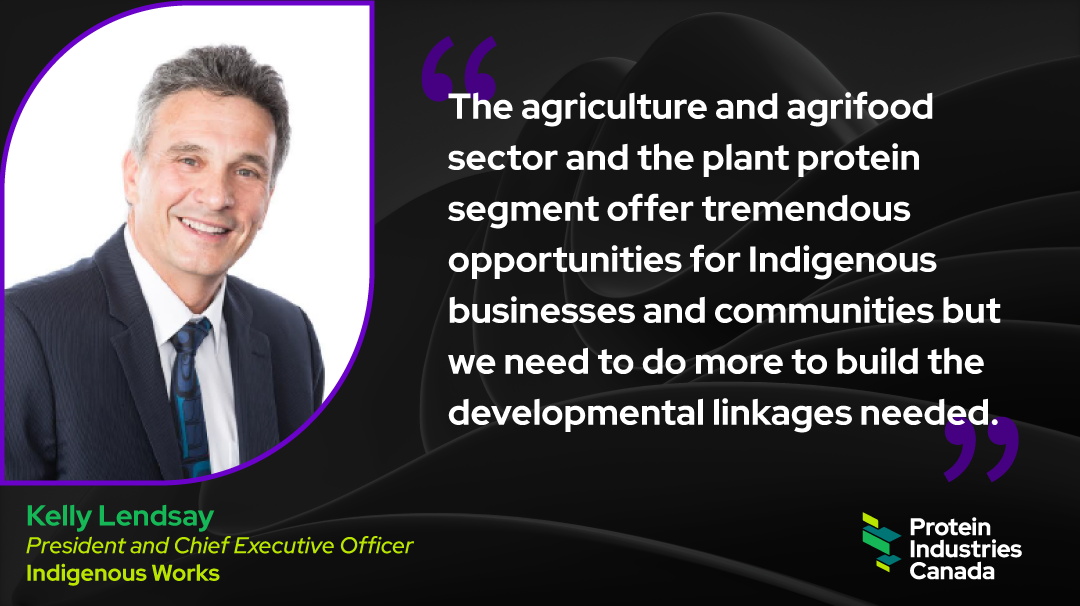Growing Indigenous-led Research and Innovation Partnerships
- Posted:

Indigenous Works has been working with Protein Industries Canada to identify opportunities to grow Indigenous-led research and innovation partnerships in the Indigenous agriculture and agrifood sector.
Founded as a national non-profit organization in the late 1990s, Indigenous Works focuses on the inclusion and engagement of Indigenous people in the Canadian economy. A few years ago, the organization created Luminary, an initiative involving 150 partners intent on building a stronger Indigenous research and innovation ecosystem in Canada.
Fast forward to 2021. Luminary worked with Protein Industries Canada and additional partners—including presenting sponsor Nutrien, Farm Credit Canada, and researchers and consultants from both the University of Regina and University of Saskatchewan—to engage with the Indigenous community to identify a plan by which these communities can leverage plant protein opportunities to advance their participation in the agriculture and agrifood sectors. This capacity building project was focused on the importance of closing the gaps between post-secondary and research institutions and Indigenous businesses.
“Indigenous Works’ research and strategy work with the Indigenous agriculture and agrifood sector benefitted greatly from a working relationship that developed with The Deans Council, Agriculture, Food and Veterinary Medicine (AFVM),” said Craig Hall, Chief Operating Officer for Indigenous Works. “The 13 AFVM faculties are based within 11 of the most eminent universities in Canada. Individually, these institutions have developed strategies to build Indigenous engagements; Luminary offers a further bridge to grow these collaborations collectively.”
“Luminary’s efforts are dedicated to building on the good work that is taking place in Canada’s post-secondary research institutions and understanding ways of growing Indigenous research and innovation as a catalyst to Indigenous jobs, economic growth and wellbeing,” added Kelly Lendsay, President and CEO of Indigenous Works and Founder of the Luminary initiative. “The agriculture and agrifood sector and the plant protein segment offer tremendous opportunities for Indigenous businesses and communities but we need to do more to build the developmental linkages needed.”
Bill Greuel, CEO of Protein Industries Canada, is also committed to increasing Indigenous representation within the economic opportunities presented by the growth of the plant-based ecosystem.
“The Indigenous Works and Luminary partnership will help Protein Industries Canada continue to explore collaborations with First Nations and Metis to create wealth and jobs,” Greuel said. “Initiatives such as Luminary are important in increasing understanding and forming partnerships to grow Canada’s plant-based food, feed and ingredient sector.”
Project organizers met with Indigenous entrepreneurs, economic development corporations and community groups and liaised with researchers who assisted with data collection and analysis. They held webinars, some of which involved the U.S. Intertribal Agriculture Council and American Indian Foods.
“This group,” explained Lendsay, “has a website, they have staff, they have 13 districts throughout the USA market and sell Native American traditional food on their website every day—500 Native American Food products. And they have been operating since 2003. We’ve learned a lot from our Native American friends and they have signed onto the Luminary vision, which is opening up discussions about intellectual property, partnerships, branding and new international marketing."
Hall noted, “The webinars are a way to stimulate the dialogue needed among post-secondary institutions, Indigenous businesses and agriculture NGOs to talk a bit more about the positioning of Indigenous agri-products and services within the larger Canadian and export marketplaces. Further work and research would help to crystalize what a branding and marketing strategy could look like—perhaps based on this American model we’re learning about.”
Generally, the partners reached many important goals during the project and identified steps still needed to expand Indigenous engagement in the agriculture and agrifood sectors, and more specifically in the plant protein sub-sector. Additional engagement strategies include a need to grow collaborations between Indigenous communities/businesses and post-secondary research organizations, as well as with research funders and investors.
“We did really well,” said Hall. “We assembled a new profile of the sector, did an issues analysis and identified some prescriptions on how to move forward. We have laid some foundations for future work and we see the potential for more collaborations and partnerships ahead.”
